Highlights
- This month, Emory University Libraries hosted an all-day Wikipedia workshop to inform faculty and professors about how to improve Wikipedia within higher education. Educational Partnerships Manager Jami Mathewson presented to faculty about Wikipedia, why they should work to improve Wikipedia, and how students and faculty can improve Wikipedia’s quality and equity. She was joined by Emory University Educational Analyst Jenn Sutcliffe, Classroom Program instructor Dr. Irene Browne, and American Chemical Society Wikipedia Fellow Helen Siaw. The event generated excitement about teaching with Wikipedia, and was a testament to the good experience that participants have across our programs.
- A handful of Wikipedia Fellows courses ended in September. One course, which improved Wikipedia articles based on midterm election related topics, created and expanded articles about several individuals running in primaries, such as Chrissy Houlahan and Fayrouz Saad. Others rewrote articles about complex topics like campaign finance reform in the United States and feminist political theory. Between sources, phrasing, and organization, these articles capture the importance of having strong contributions from subject experts.
- We featured numerous reflections by Wikipedia Fellows on our blog this month. Amy Dye-Reeves, an American Sociological Association Fellow, shared how the experience fit well within her professional development goals. Midwest Political Science Association Fellow Dr. Rebecca Dew reflected on the value of making knowledge available to all. And Association for Women in Mathematics Fellow Samantha Kao explained what she learned about the gender bias in Wikipedia articles and how she was able to help.
- Instructors can now click on their students’ Dashboard userpages and see how far along in the assigned trainings they are. This new feature of the Dashboard exists thanks to Amit Joki, a contributor to our open software project. The feature makes it easier for instructors to keep their students on track throughout the assignment and grade student effort at its conclusion.
Programs
Educational Partnerships
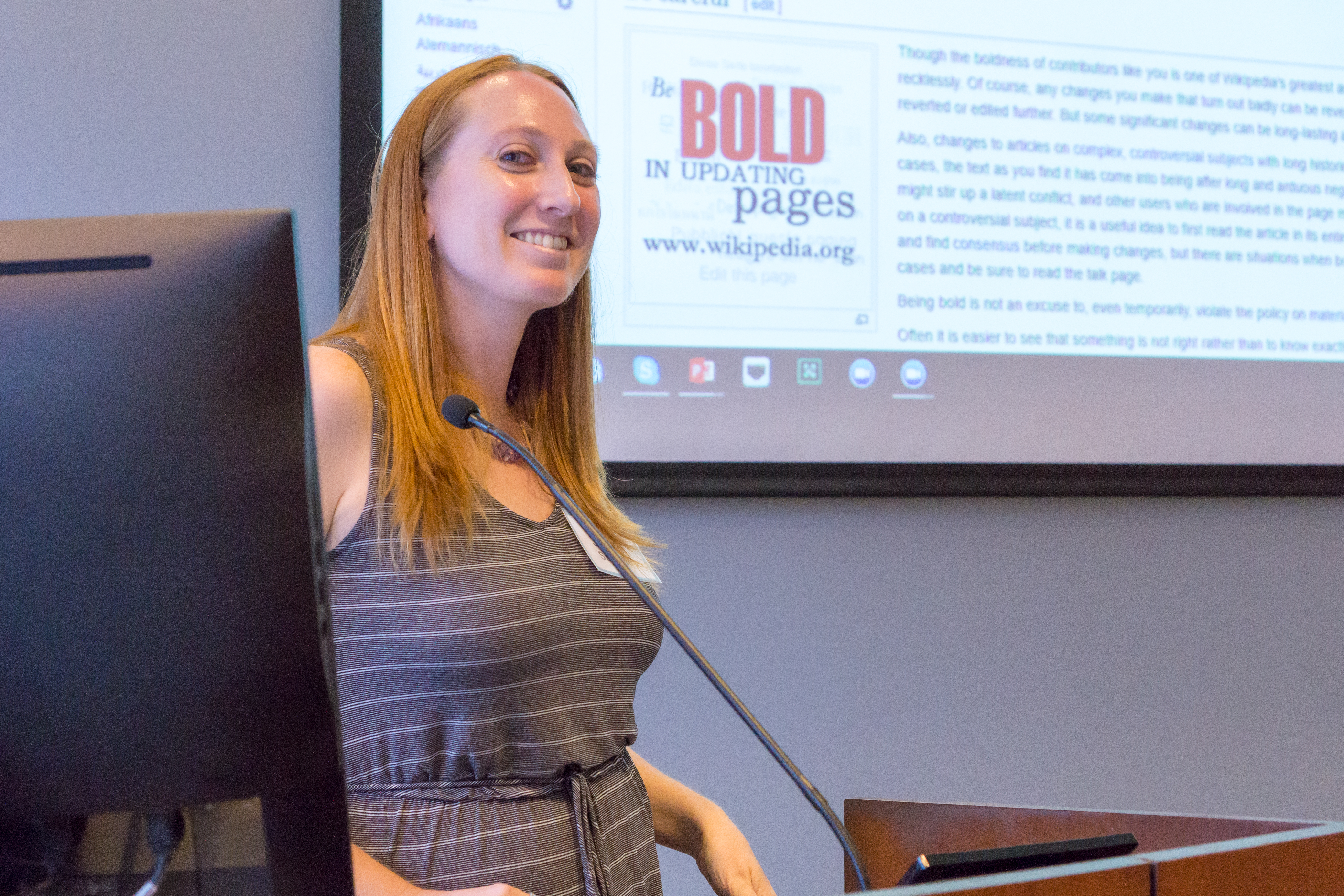
This month, Emory University Libraries hosted an all-day Wikipedia workshop to inform faculty and professors about how to improve Wikipedia within higher education. Emory University Educational Analyst Jenn Sutcliffe organized the symposium to teach participants how to incorporate Wikipedia editing into their coursework. According to Sutcliffe, “Wikipedia assignments add value by developing student research, writing, and information and digital literacy skills.” Educational Partnerships Manager Jami Mathewson presented to faculty about Wikipedia, why they should work to improve Wikipedia, and how students and faculty can improve Wikipedia’s quality and equity. Dr. Irene Browne, an Associate Professor of Sociology at Emory who has worked with Wiki Education, shared how she used Wikipedia in a Quality Enhancement Plan (QEP) course examining the wage gap. American Chemical Society Wikipedia Fellow Helen Siaw, a graduate student at Emory University who completed Wiki Education’s professional development course this summer, joined in the workshop to share her experiences learning how to edit Wikipedia’s chemistry content.
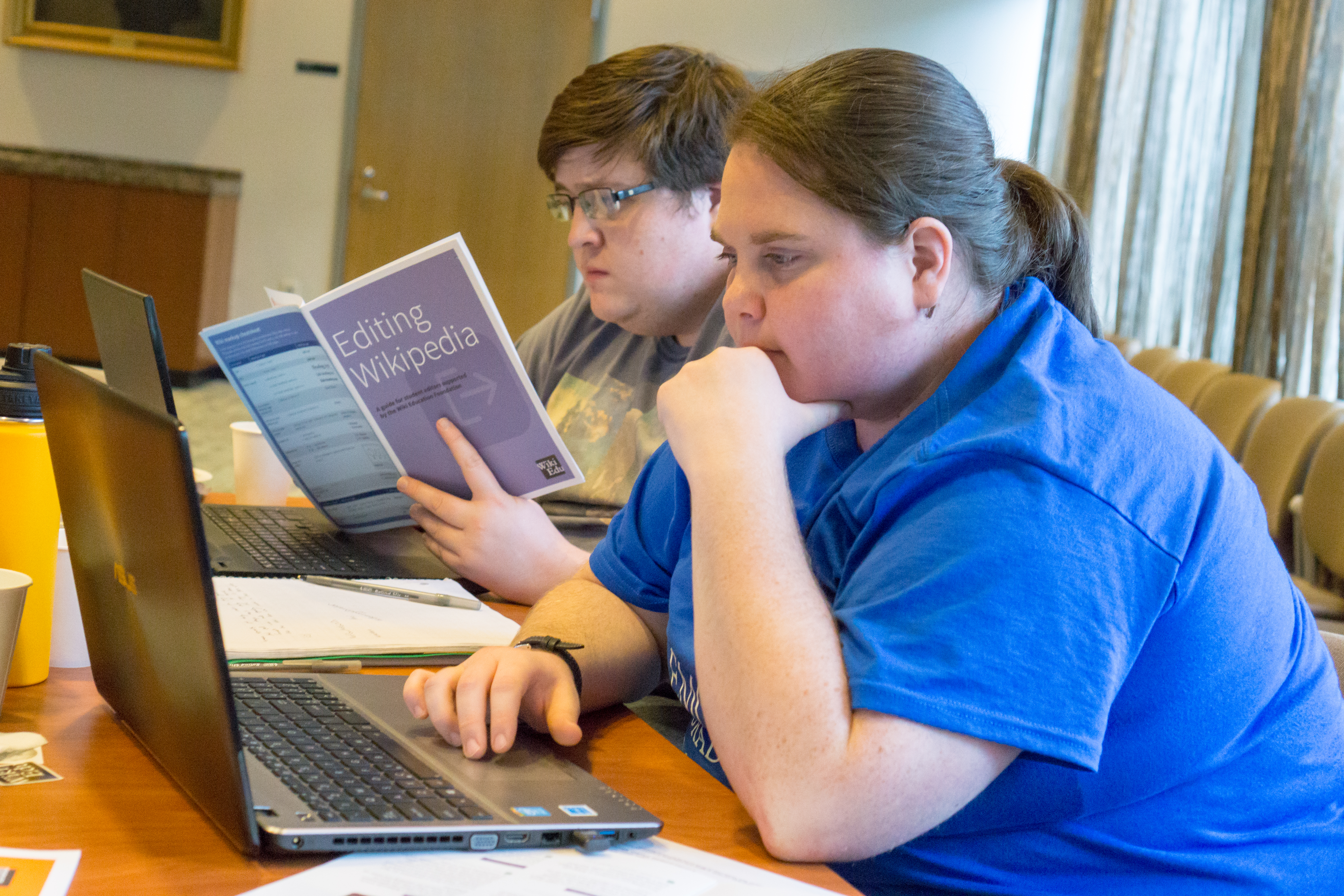
In September, Outreach Manager Samantha Weald had the opportunity to visit the Middlebury Institute of International Studies in Monterey, California, and host a discussion, also attended by remote staff from Middlebury College in Vermont, about the value of using Wikipedia in education. Attendees were brought to the idea of teaching with Wikipedia via the Newspapers on Wikipedia project, while others were simply curious to learn more about Wikipedia broadly, or expanding their use of technology in their teaching. All walked away with a better understanding of how to incorporate Wikipedia assignments into their teaching, and two instructors are already working with us in Fall 2018!
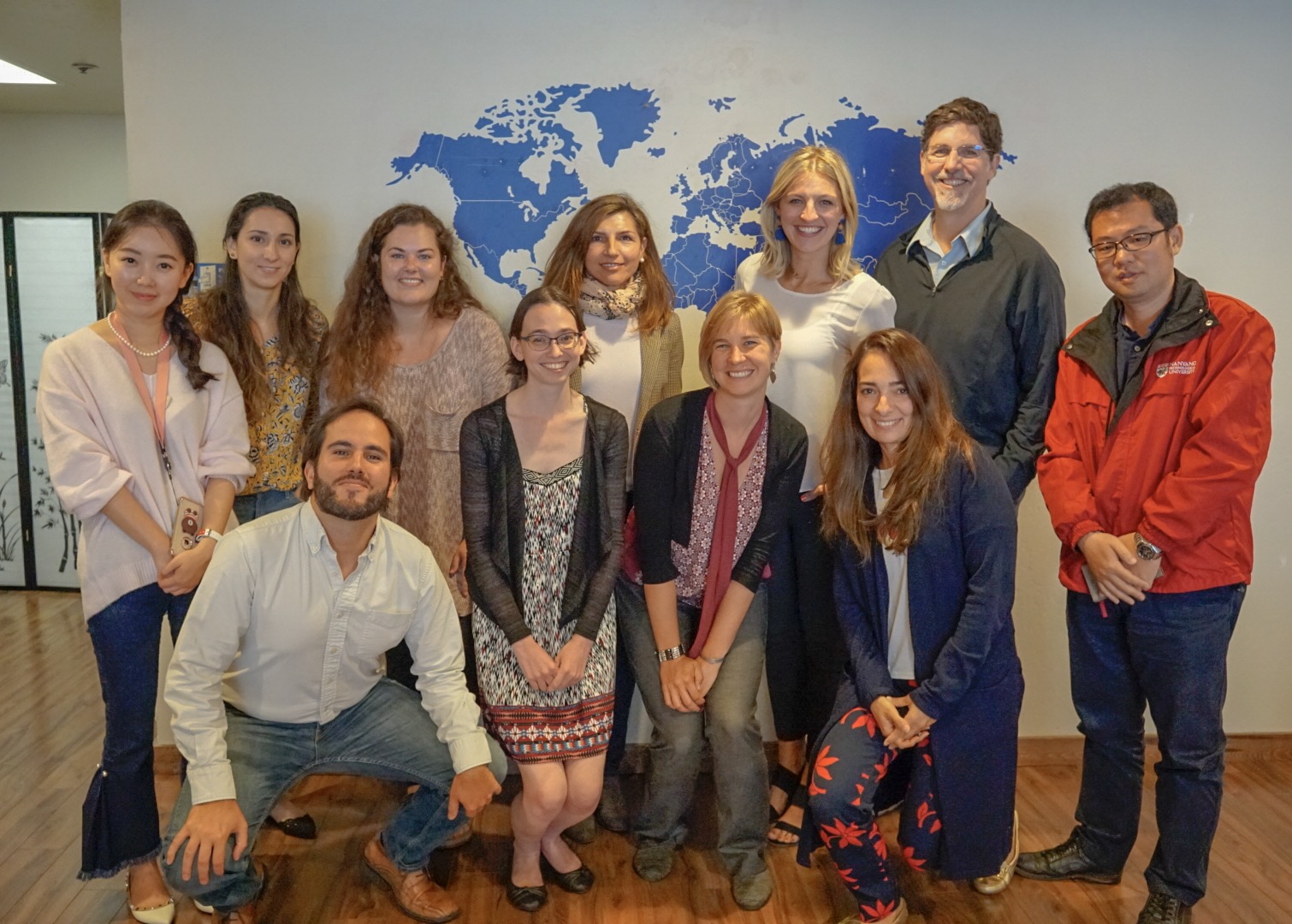
Classroom Program
Status of the Classroom Program for Fall 2018 in numbers, as of September 30:
- 300 courses were in progress (181, or 60%, were led by returning instructors).
- 5,164 student editors were enrolled.
- 67% of students were up-to-date with their assigned training modules.
- Students edited 1,130 articles, created 20 new entries, and added more than 160K words.
The fall term has begun, and students are beginning to get their feet wet as they learn how to contribute to Wikipedia and choose the topics they’ll be working on throughout the term. When it comes to learning how to contribute to Wikipedia, slow and steady wins the race. Our students go through a step-by-step process during which they gradually become familiar with the norms and policies of Wikipedia. While student contributions during these first few weeks are small, they’re gaining critical knowledge and skills that will prepare them for more major submissions.
During September, we held our first round of Wiki Education Office Hours. We offer these meetings monthly throughout the term in order to provide instructors with an opportunity to speak directly with members of the team, but also to interact with other instructors running Wikipedia assignments. The sessions are as helpful to us as they are for those who attend. We often gain insights into the program that cannot be captured through the Dashboard. We’re able to take the pulse of the Classroom Program in a much more intimate way, while providing instructors with key help regarding their Wikipedia projects.
We’re excited to have students and instructors try out the new Article Finder tool, now available under the Articles tab of all Dashboard course pages. Finding articles to work on can be one of the most challenging and rewarding parts of the Wikipedia assignment. We hope this new tool makes the process more efficient, and that ultimately allows students to find those articles where they can have the greatest impact.
Student work highlights
Picture yourself in a boat on a river. But instead of the “tangerine trees and marmalade skies” you may see in a certain Beatles song, you’re actually on the Wouri River in Cameroon watching the water flow and the cars go by on the river bridge. One student in Dr. Michel Aaij’s English Comp II class at Auburn University at Montgomery chose to expand this article. The student noticed that the article was missing information about the second bridge, which is in the process of being commissioned to span the Wouri River, the largest in the Republic of Cameroon. This new bridge will help ease the traffic on the congested existing bridge, which stretches between the major, bustling city of Douala to the port city of Bonabéri, which helps assist with international exchanges with landlocked countries like Chad and the Central African Republic.
As Halloween grows nearer, thoughts turn to something a little spooky. That may have been why one of the Shenandoah University students in Kathryn Enders’s Writing for Online Audiences class chose to edit the article on The Lodgers, a 2017 Irish gothic horror film. In the film, a twin brother and sister live a lonely life in a secluded mansion and are forced to follow a set of rules. One of these rules is that they must be in bed by midnight, as this is when the house becomes the possession of strange, watery beings. As long as they follow these rules they are mostly safe, however things go awry when the sister decides to break free of their hold, setting tragic events in motion. The Lodgersscreened at the Toronto International Film Festival and received mixed reviews from general critics and a favorable response from horror genre outlets such as Dread Central. Of note to Harry Potter and Game of Thrones fans is that David Bradley, who respectively played Argus Filch and Walder Frey, has a small but vital role in the movie.
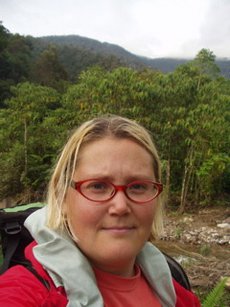
Image: File:NASA Dr Amy Townsend-Small.jpg, public domain, via Wikimedia Commons.
Students in Rebecca Barnes’ Human Impacts on Global Biogeochemical Cycles have been working to add biographies of women scientists to Wikipedia. Diane E. Pataki is an ecosystem ecologist whose work focusses on biogeochemical cycling in urban environments and is an Associate Dean at the University of Utah. Sharon J. Hall is an ecosystem ecologist at Arizona State University who studies managed ecosystems and protected areas located near cities. Yufang Jin uses remote sensing to study global environmental change. Lisa Welp is a biogeochemist at Purdue University who studies the exchange of water and carbon dioxide between the land and atmosphere. Amy Townsend-Small is at environmental scientist at the University of Cincinnati who studies the global carbon, nitrogen, and water cycles from the perspective of climate change. All of these scientists have biographies thanks to the work of this class.
As the oft cited statement says, a picture can tell a thousand words. Well, students in University of Alabama professor Darrin Griffin’s COM 300 Human Communication Research have pictures that can tell almost a novel’s worth of stories, ranging from a sunny day at the marina in Sorrento, Italy to an evening outside of the humorously named “Big Ass Slices” pizzeria in Philadelphia, United States. If those two examples are not your cup of “tee”, then there’s also a shot of a golf course in the Colorado mountains. Oh, and let’s not forget our four legged canine friends! That’s right — that’s friends in plural, as we have two happy golden retrievers lounging in the sun!

Image: File:SorrentoItalia.jpg, Gojazzygo1, CC BY-SA 4.0 via Wikimedia Commons.

Image: File:Big Ass Slices Philadelpjia.jpg, Mppawlowski2, CC BY-SA 4.0 via Wikimedia Commons.
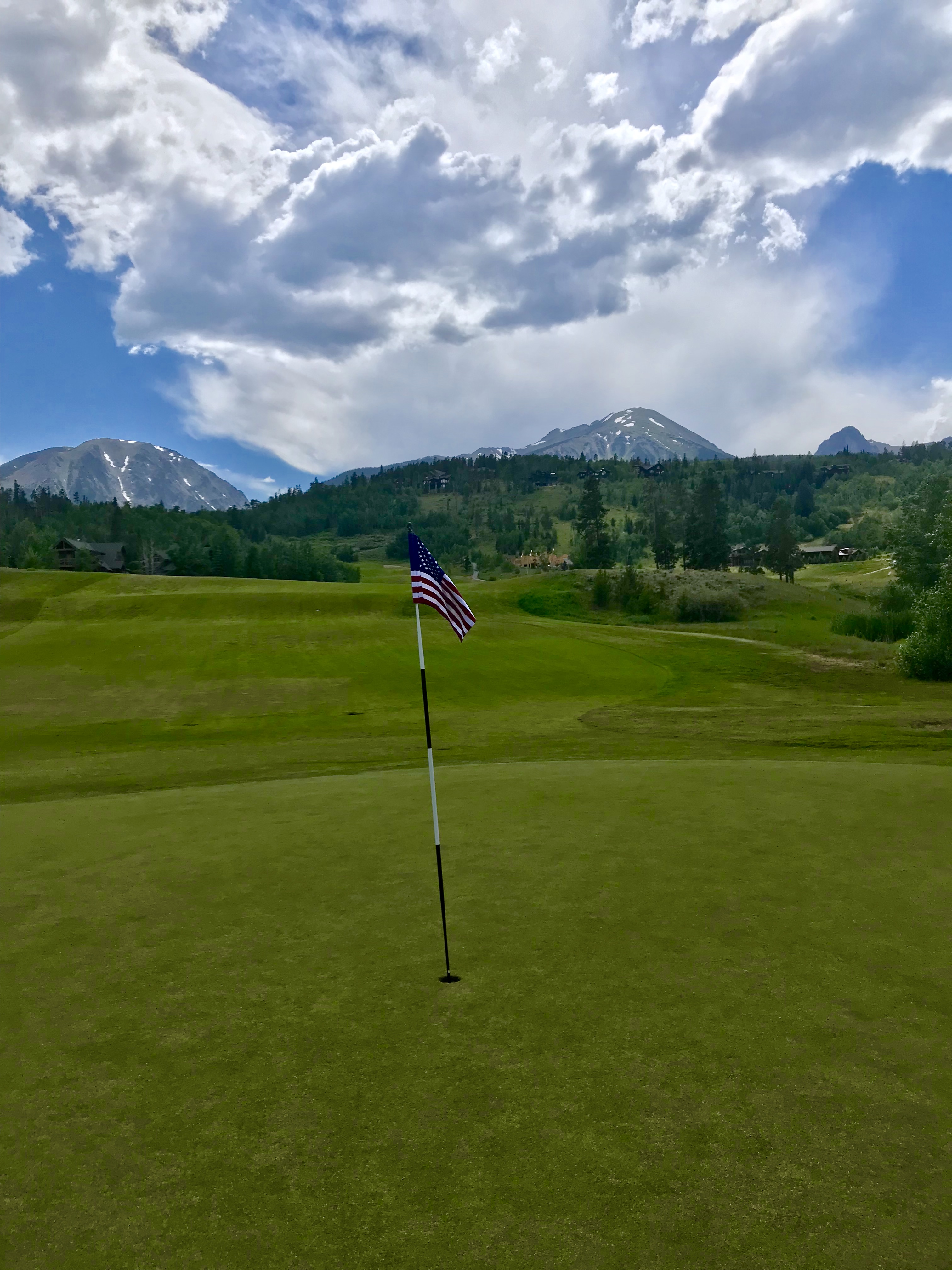
Image: File:Golf in the mountains.jpg, Ndebel, CC BY-SA 4.0 via Wikimedia Commons.
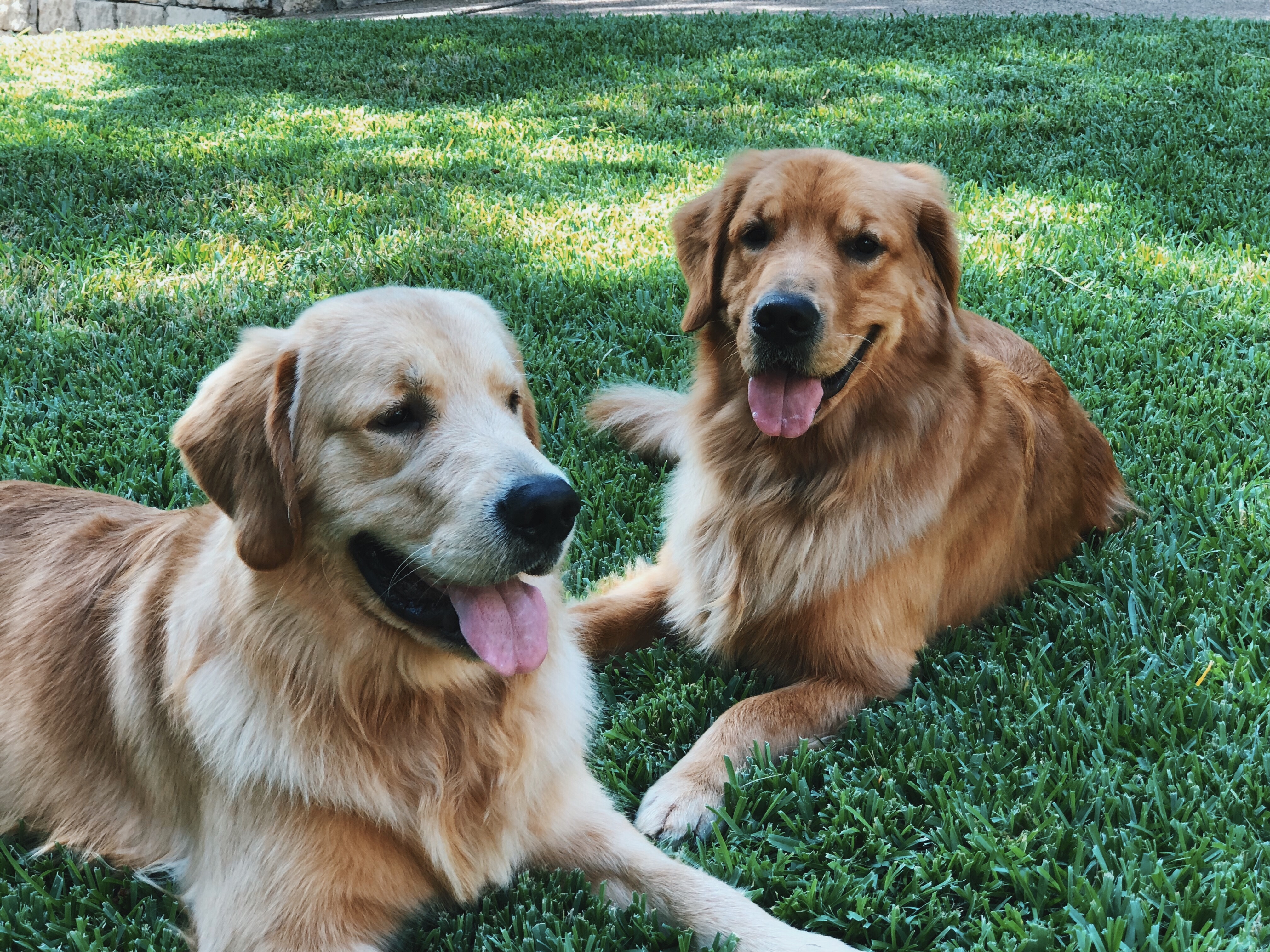
Image: File:Fullsizeoutput c236.jpg, Laneyhoward, CC BY-SA 4.0 via Wikimedia Commons.
Community Engagement
Visiting Scholars
Our Visiting Scholars have been hard at work adding references, new sections, removing content, retitling, and providing substantial edits to many articles this past month.
Rosiestep has been adding some great images to Commons. She has also been busy creating and significantly expanding numerous articles about women writers. Dora Greenwell, for example, was an English poet in the 1800s. Not many details of her life were made public during her career, and so many assumed her name was a pseudonym for another writer. A volume of her poetry was published in 1861 and another in 1867, both of which featured Christian religious themes. She also wrote essays on women’s education and suffrage, as well as essays against the slave trade.
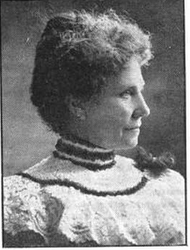
Image: File:Mrs. W. A. Johnson.png, public domain via Wikimedia Commons.
Rosiestep also improved and created articles for Belle Hunt Shortridge, an American poet and novelist, who was also the first person of European descent to be born in Wise County, Texas; Kate Stone, an American diarist and community leader whose diary paints a picture of Southern life during the American Civil War; and Elleanor Eldridge, an African American and Native American entrepreneur and memoirist who wrote her memoir in order to repurchase property that had been legally, but unfairly, taken from her.

Image: File:Oxford Female College main building.png, public domain via Wikimedia Commons.

Image: File:The Club Woman masthead November 1902.png, public domain, via Wikimedia Commons.
RockMagnetist contributed an insightful post to our blog about his efforts to avoid conflict of interest when editing.
Gen. Quon provided some essential updates to the article about Itzam K’an Ahk, a Mayan ruler who took the throne at just 12 years old and experienced several wars during his reign. Itzam K’an Ahk marked his time as ruler with many monuments devoted to him and his accomplishments. These are useful tools for providing modern historians and archaeologists with historical context.
Bfpage significantly expanded the article about the Wikipedia logo. Did you know that among Latin, Japanese, and Arabic alphabets – Chinese, Cyrillic, Hebrew, Tamil, and many others are also represented? The initial design for the logo was created by a then 17-year-old Wikipedian in a 2001 logo contest.

Image: File:ANA officers 1937.jpg, public domain, via Wikimedia Commons.
Wikipedia Fellows
Our six courses that started in June and July have concluded! The last four months have flown by and it has been amazing to see all of the new skills that these Fellows have acquired. We have shared some enriching and challenging discussions in our weekly meetings. Fellows have produced some very impressive content. Please read about the achievements of each cohort.
Courses that started in June
- The Fellows cohort tasked with improving midterm election-related articles has been hard at work defining several common terms in political science related to voting and policy. This cohort contributed to 32 articles in the past four months. They added just under 30,000 words, with a total of 630 edits from 14 active editors. Taking the theme to heart, this group edited articles ranging from the voting gender gap in the United States to the Silent Sentinels, an influential group that supported women’s suffrage in the early 1900s. Our Fellows refined the definition of a minority group and what social and political power means. From time-sensitive additions to the article about Brett Kavanaugh to a complete overhaul of the Religious Liberty Accommodations Act article, these articles have been improved significantly in the hopes of better informing the electorate before the 2018 midterm elections(an article that one of our Fellows also edited).
- We ran a second, smaller course focusing on midterm-related articles. This group of six ended up editing 12 articles (including two new articles) with 211 edits, amassing just over 7,000 words of new content. This cohort focused on several individuals running in primaries such as Chrissy Houlahan and Fayrouz Saad. Fellows in this group took on rewriting complex topics like campaign finance reform in the United States and feminist political theory. Between sources, phrasing, and organization, these articles capture the importance of having strong contributions from subject experts. Pulling in polling results for particular congressional districts, one of our Fellows expanded the entry for North Carolina’s 4th congressional district.
We also ran a course of subject experts who we encouraged to edit any kind of article they wished. This group of nine contributed to 24 articles, including one new one. Similar to our other courses, this group demonstrated the level of precision subject experts can bring to their contributions. The emergence of a nameless art movement resulted in the creation of the new Motherhood Studies article. Titling was also a central concern for the Yaoi (Boys Love) article. The Fellow who edited this article generated meaningful discussion around challenges with translation, phrasing communities use vs how the public understands a topic, and how to better organize this concept. The article about space was lacking several substantial philosophy perspectives until one our Fellows updated it. This cohort spent time improving the articles of many notable women including the writer and historian Paula Giddings, a prominent professor, Mary Pattillo, and the jazz great Bobbi Humphrey.

Uploaded by user: Rsg1magic, who added it to Humphrey’s biography.
Courses that started in July
These three courses also wrapped up this month. The themes of these courses encouraged participants to improve articles on Communicating Science, writing on a series of general topics, and focusing on improving the representation of women in science.
- The Communicating Science course had 17 active editors who contributed over 17,000 words to 95 articles with 676 total edits, covering all areas of the sciences, and has been producing some excellent results. Reworking the Risk Factors section on the child development article has brought some additional clarity to that article. Another Fellow has updated the article about Elisabet Engdahl adding details about her dissertation, new references, and background about her life. A Fellow reorganized several sections of the syncretism article, specifically improving formatting and adding several references. Take a look at the sociophonetics article to see how linguists in our course improved it. They saw what was missing from a high profile article that is so central to their discipline and took action to improve it. One of our Fellows edited several sections of the membrane curvature article and added an image to illustrate some of its properties. The same Fellow spent some significant time on the Hemagglutinin (Influenza) article, expanding sections with new citations and clear, descriptive language.

Image: File:Use of DIPEA in amide coupling reaction between acid chloride and an amine.png, Mglutamate, CC BY-SA 4.0 via Wikimedia Commons.
- In our largest course we saw 36 Fellows edit 92 articles, contributing 66,000 words in 1,200 edits. This group also uploaded 16 items to Wikimedia Commons. Take a moment to view the feminist poetry article, which is an excellent example of a fully formed, multi-section, well-referenced article appearing out of thin air. The topic was missing from Wikipedia before this Fellow began editing in our course. And now, this whole movement has a page dedicated to several feminist poets and their work. The feminism article also now contains more references to feminist poetry. Visit Linnea Ehri’s article to see a cleaner article and complete list of books one of our Fellows added. Another Fellow spent time working on 1491s, a Native American sketch group. This article now has more citations and is connected to other Native American-related articles with categories. The article about Judith Fetterley has a new section on the Resistant Reader thanks to a Fellow and the article about Iwona Stroynowskinow exists thanks to a Fellow. The article for affinity labeling should be a little easier to read now thanks to some reorganizing a Fellow did. Jennifer Doudna’s article has several new citations, sections, and some descriptions about her accomplishments.
- In the Women in Science cohort we are specifically adding content to create or improve biographies of women scientists and their accomplishments. These sixteen Fellows produced some amazing work, adding 27,000 words, contributing to 64 articles with 782 total edits. They continued adding to the list of inventions and discoveries by women. Working to close the content gap in representing women in science on Wikipedia, a Fellow created the article for Sarah Reisman. Another Fellow expanded Susan Lindquist’s article to better capture her professional accomplishments. You can also look at Yu Myeong-Hee’s article to see more accurate information regarding her name, research, and a list of the awards she has won. Georgia Perakis’article has a new set of clearly named sections. Take a look at Lisa Morrissey LaVange’s article for another example of a robust article that one of our Fellows created from scratch.
Program Support
Communications
We featured numerous reflections by Wikipedia Fellows on our blog this month. Amy Dye-Reeves, an American Sociological Association Fellow, shared how the experience fit well within her professional development goals. Midwest Political Science Association Fellow Dr. Rebecca Dew reflected on the value of making knowledge available to all. And Association for Women in Mathematics Fellow Samantha Kao explained what she learned about the gender bias in Wikipedia articles and how she was able to help.
We also republished two blog posts by instructors in our Classroom Program. Dr. Rebecca Barnes spoke to the importance of representing women in STEM on Wikipedia. She even invited Wikipedia advocates Dr. Jess Wade and Dr. Maryam Zaringhalam to speak to her class. Dr. Denneal Jamison-McClung also wrote about the importance of recognizing the lives and accomplishments of women in STEM on the world’s most accessible encyclopedia.
Blog posts:
- Year long project: Women in STEM Wikipedia Biographies (September 7)
- STEM students learn applied communication skills by contributing to Wikipedia (September 7)
- Student-written Wikipedia articles compiled in textbook for future classmates (September 11)
- Wikipedia: an important frontier for scientific knowledge (September 12)
- Continuous Professional Development: redeveloping a new information literacy platform (September 13)
- Lifting Our Voices: Highlighting the Global Contributions of Women in STEM on Wikipedia (September 14)
- Can a paid Visiting Scholar avoid conflict of interest? (September 18)
- Exploring the intersection of digital literacy and social justice on Wikipedia (September 19)
- Why edit Wikipedia as a scholar? Collaboration is necessary to advance knowledge (September 20)
- Partnering with the Deep Carbon Observatory to increase global understanding of Earth science (September 25)
- Monthly Report, August 2018 (September 26)
- Learning about gender bias in Wikipedia articles (September 27)
External media:
- Where are Wikipedia’s women scientists?, Katharine Sanderson, Chemical and Engineering News, (September 16)
- Wiki Edu Campus Visit: Teaching & Learning in the Public Sphere with Wikipedia. Bob Cole. Middlebury Institute of International Studies at Monterey. (September 17)
Technology
This month we a made a substantial set of upgrades to the Dashboard, of both the user-facing and behind-the-scenes varieties. In addition to multiple bug fixes, new features include:
- the Upload Viewer, which lets you zoom in to get more details about any image from the Uploads tab without leaving the Dashboard (thanks to Urvashi Verma);
- a list of a user’s training module progress — including both assigned and non-assigned training modules — which shows up on each user’s profile page (thanks to Amit Joki);
- a new, interactive version of the ‘Structural Completeness’ ORES graphs for each course, which now works for all the languages that are supported by an ORES ‘article quality’ model (instead of just English Wikipedia).
Behind the scenes improvements include:
- upgrading to the latest versions of several key JavaScript tools — Babel and Webpack — which result in more efficient code and less bandwidth usage (thanks again to Amit Joki);
- replacing the usage of an unmaintained browser tool for our automated tests with an up-to-date alternative; and
- substantial progress toward upgrading the React framework that drives most of the Dashboard’s user interface.
We’re now preparing for the upcoming December-March round of the Outreachy internship program. This time around, our summer interns Urvashi Verma and Pratyush Singhal are both returning to co-mentor the planned Outreachy project, which will focus on creating a better event setup experience for the diverse needs of Programs & Events Dashboard organizers. Applicants have begun making contributions to the Dashboard codebase as part of the application process.
Directory of Technology Sage Ross also met with a team of students from North Seattle College who will be working for the next two months to develop the first version of an Android app for accessing the Dashboard.
Finance & Administration / Fundraising
Finance & Administration
Overall, the total expenses in September were $147K, $80K less than was budgeted. Fundraising was significantly under budget ($66K). This was due to not hosting a cultivation event ($11K) and a change in plans with regard to outside consulting ($55K). Programs were under by ($9K), mainly due to the drop in payroll due to the Director’s leave. The remaining ($2K) discrepancy can be attributed to occupancy costs.
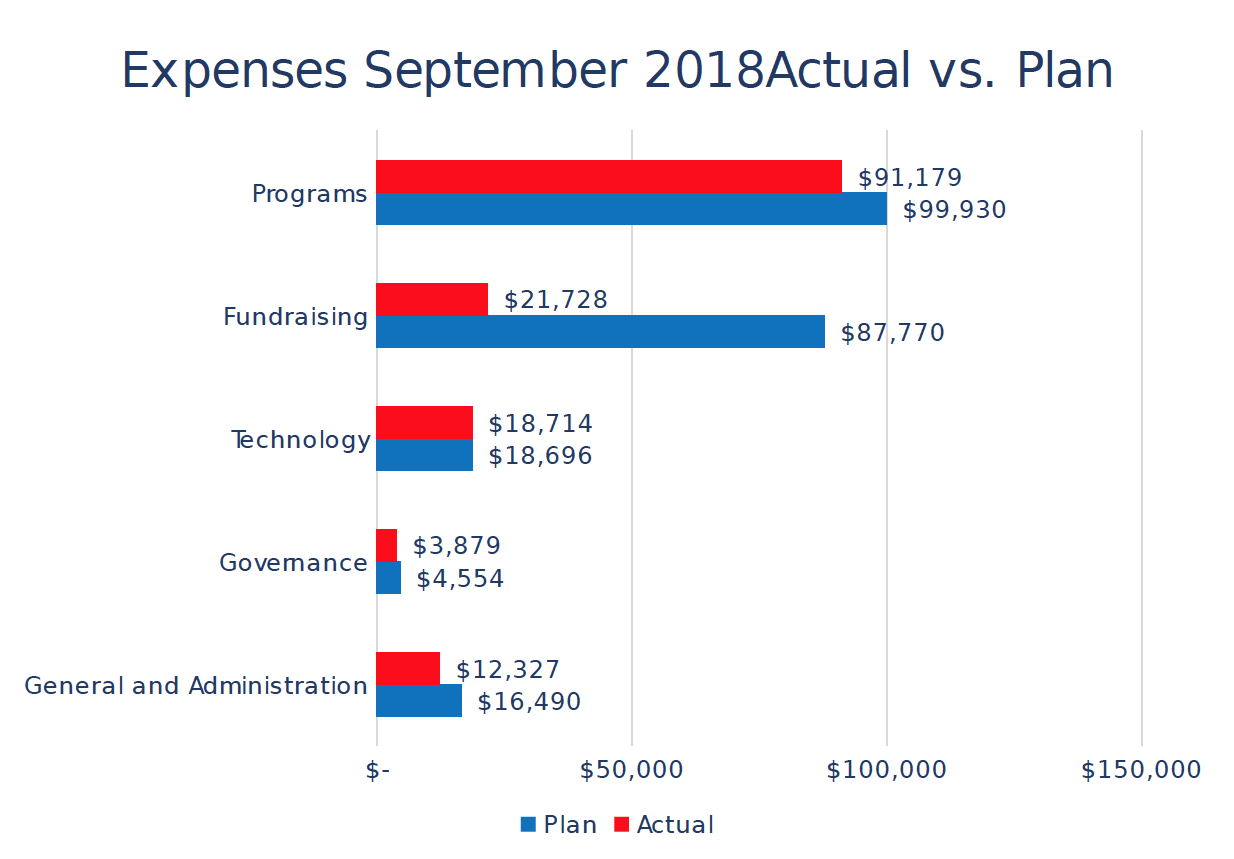
The Year-to-date expenses are $290K, $166K under budget. Programs are under budget by $81K. ($20K) Payroll Expenses, ($14K) Professional Fees, ($12K) Volunteer Development, ($14K) Travel, ($14K) Printing the strategic plan that got pushed out, ($7K) Indirect Expenses based on occupancy. Technology is under by ($6K)-due to outside services that have been pushed into fall. General and Administration are under by ($17K) mainly due to deliberately pushing non-essential costs forward.
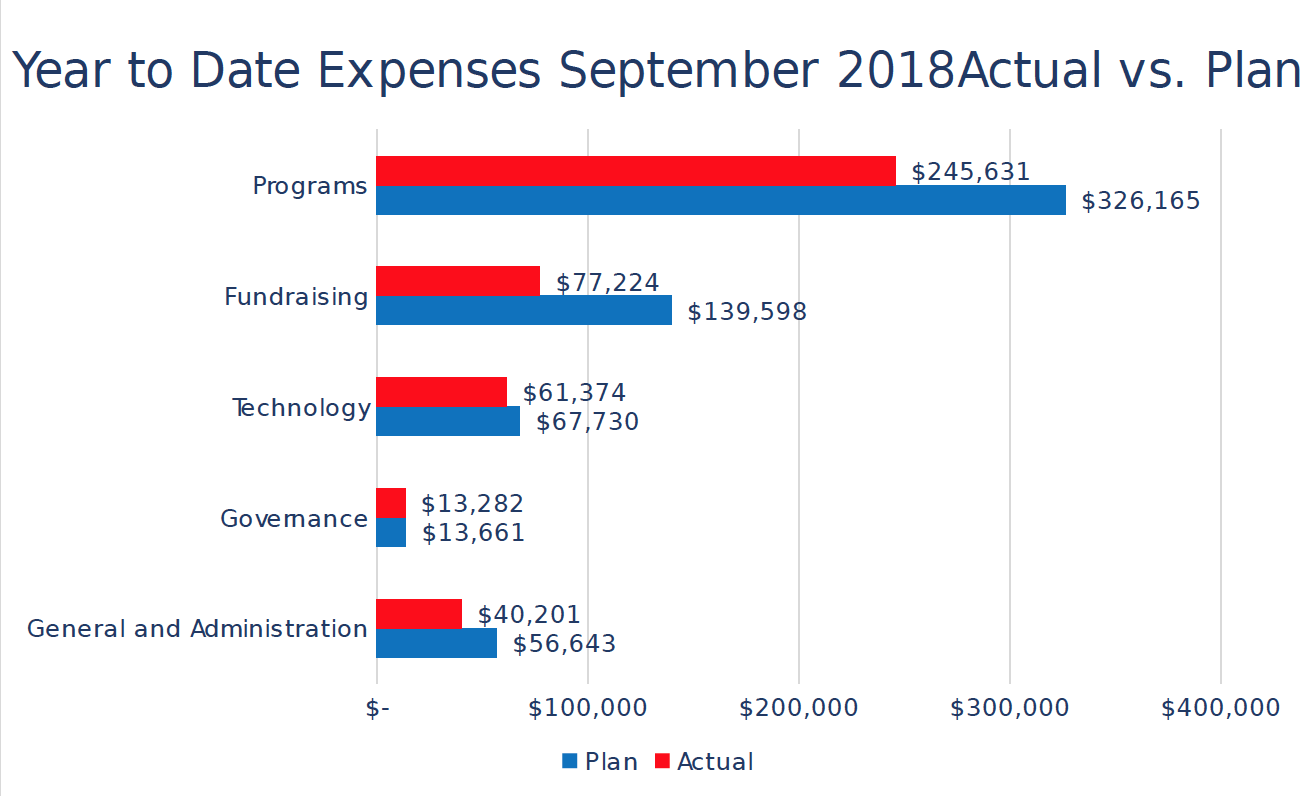
Fundraising
In September, we worked with the University Library System and School of Information Sciences at Wayne State University (WSU) to submit a Letter of Intent for the Laura Bush 21st Century Librarian Grant Program at the Institute for Museum and Library Services. In the letter, WSU proposed to partner with Wiki Education to create a replicable model for other college libraries to teach students data literacy skills. The proposed work will expand and improve Wikidata content, which has seen increased use by individual researchers, the public, and through personal digital assistants such as Alexa, Google Home, and Siri.
Throughout the month, Director of Development and Strategy TJ Bliss had email and phone conversations with several major funders about our Wiki Scholars & Scientists program, the continuation of our Wikipedia Fellows professional development courses. Some funders expressed interest in learning more about the idea and others indicated that they would be willing to share information within their networks. The general response from funders about Wiki Scholars & Scientists has been highly positive, even among the few funders who have declined to provide support. One of our current funders became so interested in the Wiki Scholars & Scientists idea that they called and asked how they could offer support and help us succeed in the early stages of the project.
TJ worked hard this month to get Wiki Education set up to submit a grant proposal to the National Science Foundation. This work included ensuring Wiki Education was signed up with and verified by all of the appropriate government agencies and contractors (DUNS, DoD, research.gov, FASTLane, etc.). TJ also drafted a 2-page concept note and sent the note to two Program Officers at NSF for initial review. The concept note describes a proposed two-day summit on the topic “Science and Wikipedia: The Role of Open Knowledge Efforts in Scientific Research and Communication.” The summit would convene members of the scientific, open knowledge, higher education, and funding communities to discuss the opportunities and challenges Wikipedia and other open knowledge projects represent to scientific research and the communication of scientific knowledge.
Finally, TJ submitted a final report for the 2017–2018 General Operating Support grant from the Hewlett Foundation, officially closing this grant (which was renewed in August 2018). Sage also had a check-in call with Delphine Menard of the Wikimedia Foundation to discuss the mid-year report for our current Annual Plan Grant. Delphine provided very helpful feedback on our work over the first 6 months of 2018.
Office of the ED
- Current priorities:
- Change management: recalibration of individual roles and the way different parts of the organization work with each other
After coming back from a vacation in Germany, Executive Director Frank Schulenburg interviewed the final candidates for our new half-time Wikipedia Expert position.
In preparation for an upcoming trip to South Korea, Frank started to prepare his presentations for the Global HR Forum 2018 in Seoul and at the Korea Advanced Institute of Science and Technology (KAIST) in Daejeon. Also, in advance of this trip, Frank answered questions from the newspaper Korean Economic Daily about the use of Wikipedia in higher education and the future of education in general.
After Director of Programs and Deputy Director LiAnna Davis came back from maternity leave in the second half of September, Frank provided her with updates and orientation in order to support her with taking on her previous role.
Also in September, Frank started preparations for the upcoming audit. He discussed the process with Susan Malone from San Francisco auditors Hood & Strong and with Jordan Daly from SFBayFinancials. Frank started working on a timeline for the upcoming months in order to coordinate the work of the auditors, staff, outside contractors, and the board’s finance and audit committee.
* * *
